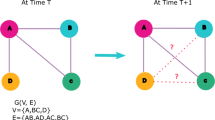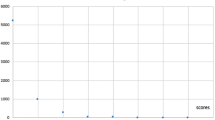Abstract
Top-k shortest path routing problem is an extension of finding the shortest path in a given network. Shortest path is one of the most essential measures as it reveals the relations between two nodes in a network. However, in many real world networks, whose diameters are small, top-k shortest path is more interesting as it contains more information about the network topology. In this paper, we apply an efficient top-k shortest distance routing algorithm to the link prediction problem and test its efficacy. We compare the results with other base line and state-of-the-art methods as well as with the shortest path. Our results show that using top-k distances as a similarity measure outperforms classical similarity measures such as Jaccard and Adamic/Adar.
Access this chapter
Tax calculation will be finalised at checkout
Purchases are for personal use only
Similar content being viewed by others
References
Akiba, T., Hayashi, T., Nori, N., Iwata, Y., Yoshida, Y.: Efficient top-k shortest-path distance queries on large networks by pruned landmark labeling. In: AAAI 2015, pp. 2–8 (2015)
Akiba, T., Iwata, Y., Yoshida, Y.: Fast exact shortest-path distance queries on large networks by pruned landmark labeling. In: SIGMOD 2013, pp. 349–360 (2013)
Angles, R., Gutierrez, C.: Survey of graph database models. ACM Comput. Surv. 40(1), 1:1–1:39 (2008)
Eppstein, D.: Finding the \(k\) shortest paths. SIAM J. Comput. 28(2), 652–673 (1999). doi:10.1137/S0097539795290477
Goldberg, A.V., Harrelson, C.: Computing the shortest path: a search meets graph theory. In: SODA 2005, pp. 156–165 (2005)
Lal, M.: Neo4J Graph Data Modeling. Packt Publishing, Birmingham (2015)
Lee, J.Y., Oh, J.C.: A model for recursive propagations of reputations in social networks. In: Proceedings of the 2013 IEEE/ACM International Conference on Advances in Social Networks Analysis and Mining, pp. 666–670. ACM (2013)
Lee, J., Duan, Y., Oh, J.C., Du, W., Blair, H., Wang, L., Jin, X.: Automatic reputation computation through document analysis: a social network approach. In: International Conference on Advances in Social Networks Analysis and Mining (ASONAM), pp. 559–560. IEEE (2011)
Lee, J., Oh, J.C.: Convergence of true cooperations in bayesian reputation game. In: IEEE 13th International Conference on Trust, Security and Privacy in Computing and Communications (TrustCom), pp. 487–494. IEEE (2014)
Lee, J., Oh, J.C.: Estimating the degrees of neighboring nodes in online social networks. In: Dam, H.K., Pitt, J., Xu, Y., Governatori, G., Ito, T. (eds.) PRIMA 2014. LNCS, vol. 8861, pp. 42–56. Springer, Cham (2014). doi:10.1007/978-3-319-13191-7_4
Liben-Nowell, D., Kleinberg, J.: The link-prediction problem for social networks. J. Am. Soc. Inform. Sci. Technol. 58(7), 1019–1031 (2007)
Mazzara, M., Biselli, L., Greco, P.P., Dragoni, N., Marraffa, A., Qamar, N., de Nicola, S.: Social networks and collective intelligence: a return to the agora. IGI Global (2013)
Qu, Q., Chen, C., Jensen, C.S., Skovsgaard, A.: Space-time aware behavioral topic modeling for microblog posts. IEEE Data Eng. Bull. 38(2), 58–67 (2015)
Qu, Q., Liu, S., Yang, B., Jensen, C.S.: Integrating non-spatial preferences into spatial location queries. In: SSDBM 2014, pp. 8:1–8:12 (2014)
Robinson, I., Webber, J., Eifrem, E.: Graph Databases. O’Reilly Media Inc., Sebastopol (2013)
Author information
Authors and Affiliations
Corresponding author
Editor information
Editors and Affiliations
Rights and permissions
Copyright information
© 2017 Springer International Publishing AG
About this paper
Cite this paper
Lebedev, A., Lee, J., Rivera, V., Mazzara, M. (2017). Link Prediction Using Top-k Shortest Distances. In: Calì, A., Wood, P., Martin, N., Poulovassilis, A. (eds) Data Analytics. BICOD 2017. Lecture Notes in Computer Science(), vol 10365. Springer, Cham. https://doi.org/10.1007/978-3-319-60795-5_10
Download citation
DOI: https://doi.org/10.1007/978-3-319-60795-5_10
Published:
Publisher Name: Springer, Cham
Print ISBN: 978-3-319-60794-8
Online ISBN: 978-3-319-60795-5
eBook Packages: Computer ScienceComputer Science (R0)




